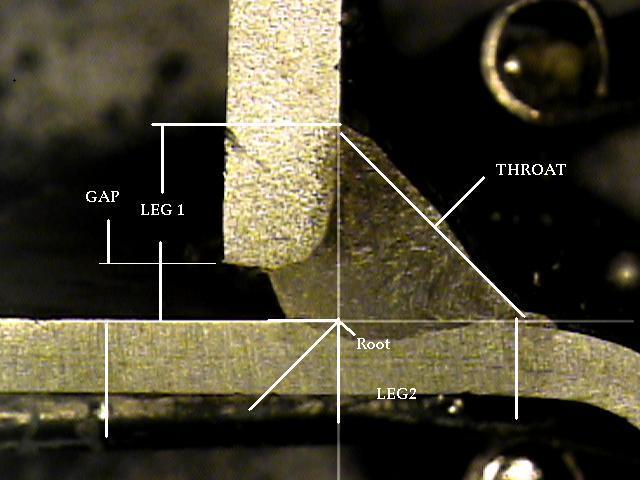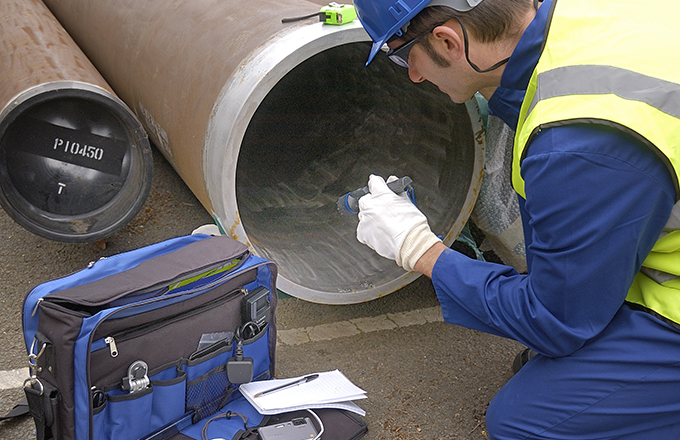Leading Advantages of Working With Experts for Welding Inspection Madison
Leading Advantages of Working With Experts for Welding Inspection Madison
Blog Article
Checking Out Advanced Equipment and Techniques for Accurate Welding Examination
In the realm of welding assessment, the search of accuracy and dependability is vital, spurring the growth of innovative tools and methodologies. Laser scanning innovations and automated evaluation systems, equipped with man-made knowledge, are redefining the landscape by lowering human mistake and enhancing security measures.
Ultrasonic Evaluating Innovations
Ultrasonic screening developments often represent the center of advancements in welding evaluation modern technologies. These innovations have actually dramatically improved the capacity to detect and examine discontinuities within bonded frameworks, guaranteeing improved honesty and security - Welding Inspection Madison. Ultrasonic screening employs high-frequency sound waves to penetrate materials, offering thorough information about internal attributes without causing damages. The most up to date growths in this field have focused on enhancing precision, speed, and the capability to analyze intricate data.

Additionally, improvements in software program algorithms for information analysis have boosted the accuracy of defect detection and sizing. Automated ultrasonic testing systems currently provide high-resolution imaging, allowing thorough analyses of weld quality. These systems are usually incorporated with advanced visualization tools, which help with the interpretation of results.
Radiographic Examination Methods
While ultrasonic screening innovations have actually established a high requirement in non-destructive examination, radiographic assessment methods continue to play an important function in welding examination by offering distinct insights right into product integrity. Radiographic screening (RT) employs the usage of X-rays or gamma rays to penetrate materials, developing a radiograph that visually stands for the inner structure of a weld. This imaging capacity is vital for spotting subsurface issues such as porosity, inclusions, and fractures that might not be visible through surface area assessments.
The process entails positioning a radiation resource on one side of the weld and a detector on the contrary side. Variations in product thickness and density affect the depletion of the rays, producing a contrasting photo that specifically defines defects. RT is specifically advantageous for examining complex geometries and thick sections where various other approaches might fail.
Despite its performance, radiographic examination has to be carried out with stringent adherence to safety and security methods due to the hazardous nature of ionizing radiation. Moreover, the interpretation of radiographs requires skilled workers, as the high quality of the analysis straight affects the reliability of the inspection. Ongoing improvements in digital radiography are boosting photo clarity and analysis efficiency, strengthening RT's vital role in making certain weld quality.
Laser Scanning Advancements
Welcoming laser scanning innovation in welding evaluation has transformed the analysis of weld top quality and stability. Unlike standard inspection methods, laser scanning offers fast data procurement, dramatically boosting the performance and precision of weld analyses.
Laser scanning advances have brought about substantial enhancements in characterizing and detecting surface area imperfections such as porosity, absence of fusion, and undercuts. The high-resolution information allows inspectors to perform extensive evaluations, making sure that welds fulfill rigorous market standards. Furthermore, this approach supports the growth of digital records, promoting long-lasting quality assurance and traceability.
In addition, laser scanning modern technology incorporates effortlessly with software remedies created for automated defect discovery and assessment. The resultant information can be easily shared and assessed, promoting collaborative decision-making processes. As markets remain to demand higher standards for weld quality, laser scanning remains at the forefront, providing exceptional precision and performance in welding evaluation.
Automated Examination Systems

Automated inspection systems offer the benefit of uniformity, removing human mistake and subjectivity from the assessment procedure. They are created to operate in various atmospheres, from production floors to remote field sites, making certain comprehensive insurance coverage. Welding Inspection Madison. These systems can be programmed to stick to particular welding criteria and criteria, giving comprehensive records and paperwork for quality assurance functions
Furthermore, the assimilation of cloud-based platforms promotes the storage and evaluation of huge quantities of evaluation information. This enables fad analysis and anticipating upkeep, allowing suppliers to deal with possible problems prior to they intensify. The adoption of automated inspection systems is a pivotal relocation towards boosting the integrity and efficiency of welding processes in industrial applications.
Enhancing Security and Effectiveness
A considerable aspect of boosting safety and security and efficiency in welding evaluation depends on the combination of ingenious modern technologies that simplify procedures and reduce dangers. The adoption of innovative non-destructive testing (NDT) methods, such as ultrasonic screening, phased array ultrasonic testing (PAUT), and radiographic testing, plays a critical function in making you can find out more sure structural stability without compromising the safety of the personnel involved. These techniques enable for thorough evaluations with minimal downtime, minimizing prospective risks connected with typical methods.
Moreover, the execution of real-time data analytics and artificial intelligence algorithms has actually transformed the means evaluation information is analyzed. By utilizing anticipating analytics, prospective issues can be determined before they show up into vital failures, making sure prompt interventions and upkeep. This positive approach dramatically enhances functional efficiency and safety and security in welding processes.
Additionally, remote evaluation innovations, including drones and robot spiders outfitted with high-resolution cams, enable inspectors to analyze hard-to-reach locations without exposing them to dangerous problems. This not just improves inspection accuracy but likewise reduces human threat. By leveraging these sophisticated devices and approaches, sectors can achieve higher security criteria and operational performance, eventually bring about more lasting and trustworthy welding evaluation methods.
Final Thought
The assimilation of innovative tools and methods in welding assessment substantially improves issue discovery and guarantees architectural honesty. These improvements not just increase inspection performance yet likewise contribute right here to boosted safety and high quality guarantee in commercial welding applications.

Ultrasonic testing innovations often stand for the leading edge of advancements in welding inspection technologies.While ultrasonic screening innovations have set a high criterion in non-destructive examination, radiographic examination methods continue to play an important role in welding inspection by providing special understandings right into product stability.Embracing laser scanning technology in welding examination has actually reinvented the assessment of weld quality and honesty. As industries continue to require higher criteria for weld high quality, laser scanning continues to be at the center, using unparalleled accuracy and efficiency in welding inspection.
Automated examination systems offer the advantage of consistency, eliminating human mistake and subjectivity from the assessment process.
Report this page